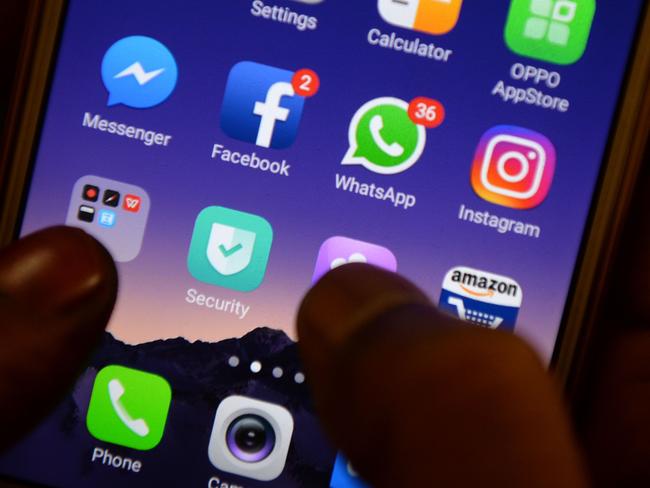Keith Murdoch Oration 2019: Robert Thomson predicts a global digital reckoning
The liberating idealism that once characterised the internet has given way to a new emptiness and anomie — the result of sanguinely supine leaders allowing seriously bad behaviour to become institutionally ingrained and dominant digital companies culturally ill-equipped to cope with the contemporary challenges.
Opinion
Don't miss out on the headlines from Opinion. Followed categories will be added to My News.
That we live in times in which everything from change to reputation to controversy is digitally amplified, with the volume often turned up to 10, has been obvious for years, or at least should have been obvious.
Having been rather vocal, sometimes too vociferously, on this subject for rather a long period, it was surprising that our society’s leaders had been so sanguinely supine.
As a result, we have institutionally ingrained some seriously bad behaviour and have dominant digital companies culturally ill-equipped to cope with the contemporary challenges.
For Big Digital, the line of least compliance should not have been the starting point for our journey into the future.

Had fewer politicians, and not just in Australia, not been seduced by net narcissism, we may have cognisant communities better able to cope with the e-existential challenges. That includes, sometimes tragically, the teenagers whose insecurities and vulnerabilities are magnified cruelly in so-called social media — or the seemingly powerful global companies that panic and prevaricate at the first mutterings of the anti-social media mob.
There is no doubt that a mob mentality has taken hold in much of the West and among the most pronounced of the mobs are illiberal liberals, who are roaming the landscape in the seemingly endless, insatiable quest for indignation and umbrage.
It is vituperation as virtue.
CONTRADICTION
So here we are on the cusp of truly extraordinary developments in Artificial Intelligence, and yet collectively, our shared level of Emotional Intelligence is plumbing the depths.
There is no doubt that our technical ability to create, to distribute and share information and images and much more, will be exponentially enhanced over the coming five years. But that is the contradiction — while we are creating that capability, we are challenging our capacity for empathy.
One example of that trend is the seething secularism that portrays any person of faith, whether an evanescent evangelical or occasional attendee at mass or synagogue or mosque or temple as a nutter, a fruitcake, a devotee of the deviant.
We are going through a strange phase in seeking affirmation through alienation, virtue in victimhood.
Like many trends in business, it is a confluence of the personal, the sectoral and the cyclical.
Where are the shared experiences in the contemporary West? Why has the village square shrunk and been subdivided?

The verticals in digital run deep and some clearly have the ability to radicalise, whether the Neo-Fascist or the jihadist.
At least there is a more vigorous debate on these subjects, and it’s clear that there will be more regulation of companies who have sought to defy definition and avoid a reckoning.
That we in the West are clumsily grappling with these issues as “developed” nations makes one wonder what the impact will be on countries, like China, India and Indonesia, that are combining their industrial revolution with a digital revolution, coping with mass rural-to-urban mobility in the age of the mobile.
HIERARCHY OF CONTENT
So we have the cross-border, and we have the crass-border, the seamless spread of witless nonsense, delivered digitally, globally, endlessly, daily. We must ask what is the provenance of digital drivel and why it was so successfully spawned in the early days of internet “idealism”?
In essence, it was because the anarchic architects believed that open-source code 010101 should be complemented by open-source content — the only problem is that there actually is a hierarchy of content and of news, the fact-based and the fantasy-based, the profound and the profane, the veracious and the vacuous.

In this e-emptiness, there is a craving for credibility and a quotidian questioning. There should be scepticism about elites, and a healthy scepticism is I presume, I hope, still part of the Australian character.
But the question we must ask is who are the elites, who is the establishment?
Australia famously dealt with a tyranny of distance, now the world has a tyranny of the distinguished, a smug, sneering elite that derides popular concerns as “populism”, and whose self-image is fuelled by an abiding sense of absolute superiority.
This is the Sir Keith Murdoch Oration but it would be remiss to ignore what Rupert has done for the media and for our country and for many other countries.
To see Rupert up close each day, to witness the restless curiosity, the endless energy, and a genuine humility is in such stark and breathtaking contrast to the ill-informed institutional critiques.
CUSTODIANS
This evening is indeed about inheritance.
About the inherited responsibilities we all have, to our land, our place, our people, our planet. We are custodians and as custodians we must be conscious of consequence and context.
We in this room are, almost without exception, people of privilege and so what will we do with that prestige, that position, that power, that possibility?

Yasunari Kawabata, the first Japanese to win a Nobel prize for literature, wrote: “Time flows in the same way for all human beings; every human being flows through time in a different way.”
How will we flow through time? How will we make the most of our time?
Robert Thomson is chief executive of News Corp. This is an edited extract of the 2019 Keith Murdoch Oration delivered by Mr Thomson on Tuesday night at the State Library of Victoria.


